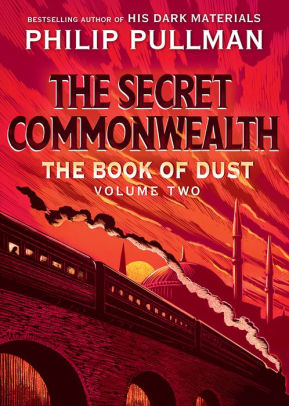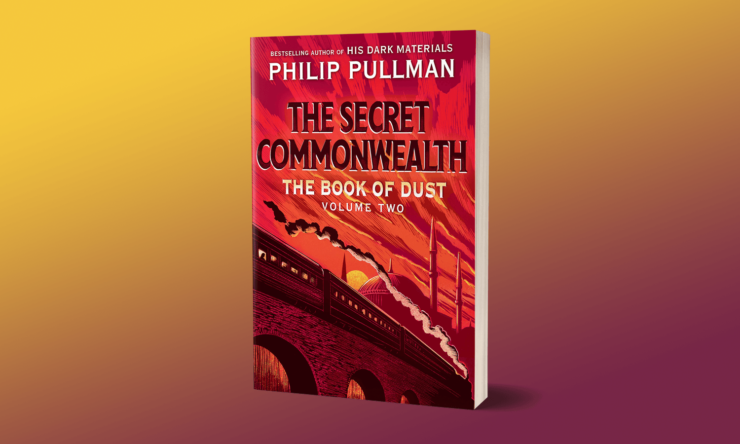The Secret Commonwealth begins twenty years after the events of La Belle Sauvage and eight years or so after Lyra’s grand adventures in the His Dark Materials trilogy. Lyra is a student now, dedicated to her studies and happy among her friends. Her chief source of trouble is a falling-out with her daemon, Pantalaimon, who has never entirely forgiven her for separating from him at the edge of the world of the dead. And she is no longer able to lie with impunity; “now,” she thinks to herself at one point, “she just lacked inventiveness, or energy, or chutzpah.”
Twenty-year-old Lyra is pensive and melancholy and fascinated by bad ideas, which here come in the form of an Ayn Rand-ish novel called The Hyperchorasmians and the Richard Dawkins-esque treatise The Constant Deceiver. Both texts are fixated on a strictly rational and rather joyless approach to Lyra’s world; The Constant Deceiver goes so far as to assert that daemons do not exist, and in the world of The Hyperchorasmians, a nine-hundred-page bestseller that denounces “anything and everything that stood in the way of pure reason,” people do not have daemons at all. Lyra’s devotion to both books understandably widens the growing rift between her and Pantalaimon, who accuses her of having lost her imagination. “You used to be optimistic,” he tells her. “I used to be young,” she replies.
But there’s far more at stake here than Lyra’s conflict with Pan; sinister forces are once again arranging themselves with Lyra at their center, this time in the form of a multinational pharmaceutical corporation that has made a fortune in painkillers and the Magisterium, the religious organization that featured prominently in His Dark Materials. Lyra is not the only focus of their interests: a furtive war of espionage and terrorism is being waged over a strain of roses closely linked to Dust. In the novel’s opening pages, Pantalaimon witnesses the murder of a botanist studying the rose oil’s effects, setting in motion a chain of events that send Lyra and her former protector-turned-professor Malcom Polstead on their own individual quests. The engine of the novel’s action is slow to rev, but once it gets going there are a multitude of pleasures here; for all her newfound sadness, Lyra remains an intrepid adventurer, and Pullman is here as always an inveterate storyteller.
While many of the original trilogy’s most beloved characters are absent—including Will, to whom Lyra remains devoted, Iorek Byrnison, and the witches of The Golden Compass—Lyra begins her journey among the gyptians, where we are reacquainted with an aged but still lively Farder Coram and an inexplicably meek Ma Costa, whose personality seems to have been replaced with cookery. From there Lyra’s journey progresses eastward, and her various subsequent adventures make for fine reading. Pullman has lost none of his power to enchant when he puts his mind to it, and some of the scenes in The Secret Commonwealth are show-stoppers. (A particular political assassination is so magnificently rendered that it will stay with me for a long time.)
Buy the Book


The Secret Commonwealth
Lyra’s travels intersect with a number of concerns pulled from our own, real world: as she travels she encounters waves of North African refugees fleeing religious persecution at the hands of a Taliban-like terrorist group called The Brotherhood of This Holy Purpose, and Malcom’s journey to find out more about the mysterious rose oil brings him into contact with the group as well. (The geopolitics of Pullman’s Middle East, alas, are not so much problematic as incoherent.)
Despite this array of enemies, none of The Secret Commonwealth’s villains are truly memorable. Lyra is pursued by a scheming Magisterium bureaucrat, Marcel Delamare, and the nefarious lout Olivier Bonneville, whose father proved so troublesome in La Belle Sauvage. But Delamare is not very sinister, and Bonneville is not very smart, and nobody is as complex and multi-layered as the splendid Mrs. Coulter, or even half so frightening. The stakes feel lower, the relationships flatter; Malcom, for example, is in love with Lyra, which would be more disturbing if there were any chemistry between their characters whatsoever. Pullman’s insistence on slowing the action down to have one character or another pontificate on the importance of imagination and magic has the ironic effect of stripping much of the magic out of the narrative. And as in La Belle Sauvage, it’s the female characters of The Secret Commonwealth who lack depth. Many of the novel’s adult women are practically interchangeable academics and administrators with sensible haircuts.
But of all the novel’s flaws, only one is truly unforgivable: a horrific, brutal, and graphic sexual assault scene that comes out of nowhere, does absolutely nothing whatsoever to advance the narrative, and comes as a stunning betrayal to readers who have spent over half our lives with these characters. The assault comes almost at the novel’s end and for me served to completely undo any enchantment or pleasure I found in what preceded it. Pullman is writing now for readers who loved His Dark Materials as children and are children no longer; why he would subject those readers to the violation of a beloved character, as vivid and well-known to some of us as our own real-life friends, is unimaginable. The Secret Commonwealth ends on a cliffhanger. This time, I’m no longer sure I want to know what happens next.
The Secret Commonwealth is available from Knopf Books for Young Readers.
Sarah McCarry is the author of the novels All Our Pretty Songs, Dirty Wings, and About A Girl, the editor and publisher of the chapbook series Guillotine, and the Executive Director of the Eve Kososfky Sedgwick Foundation. Her work has been shortlisted for the Lambda Award, the Norton Award, and the Tiptree Award, and she has received fellowships from the MacDowell Colony, the Joint Quantum Institute, the Launchpad Writers’ Workshop, and The Arctic Circle.










